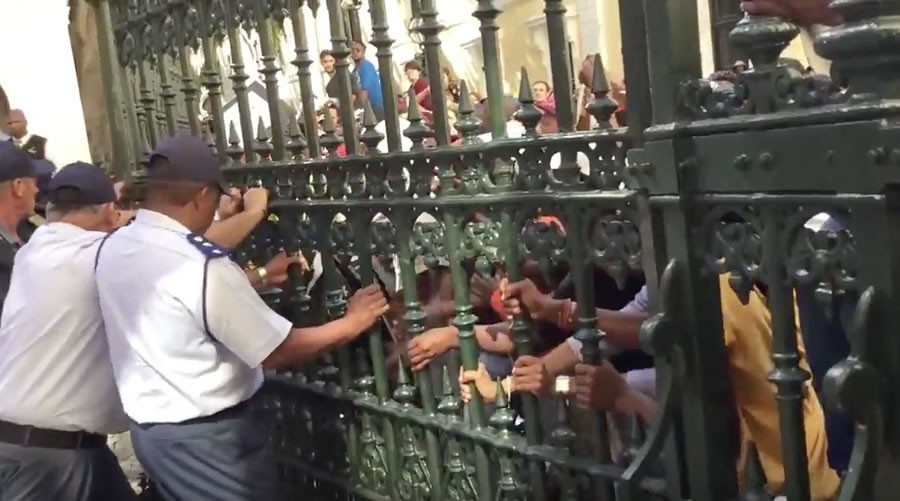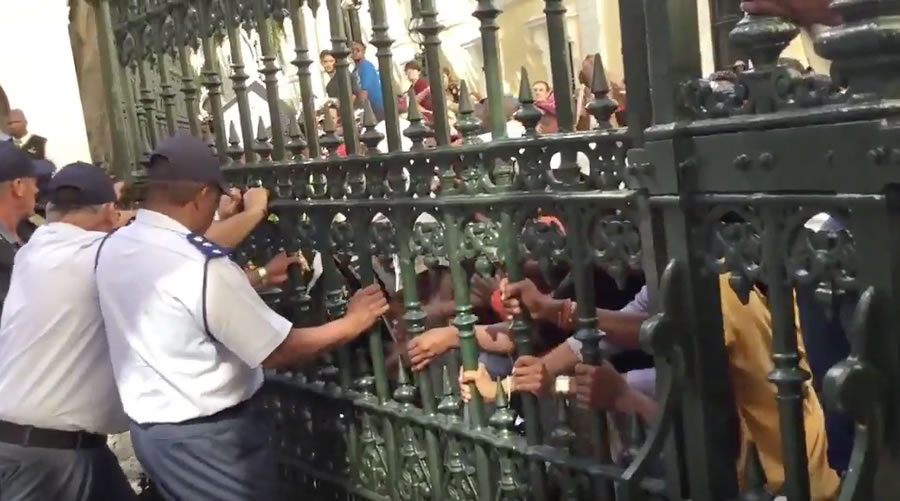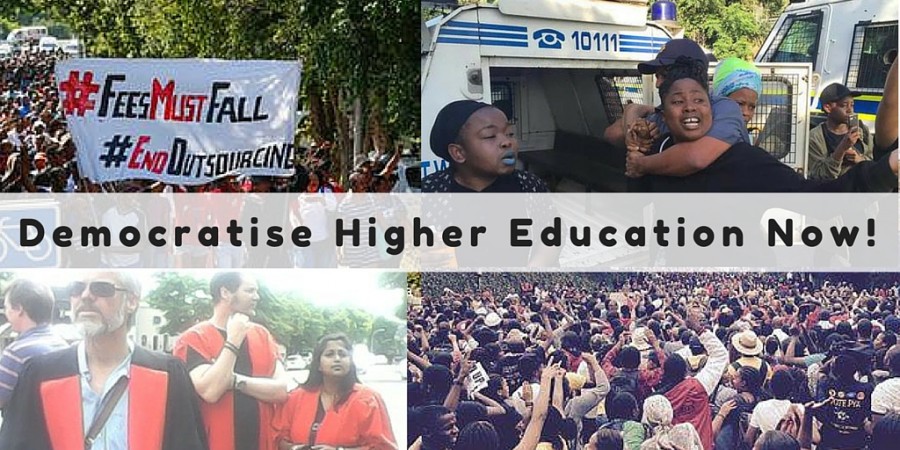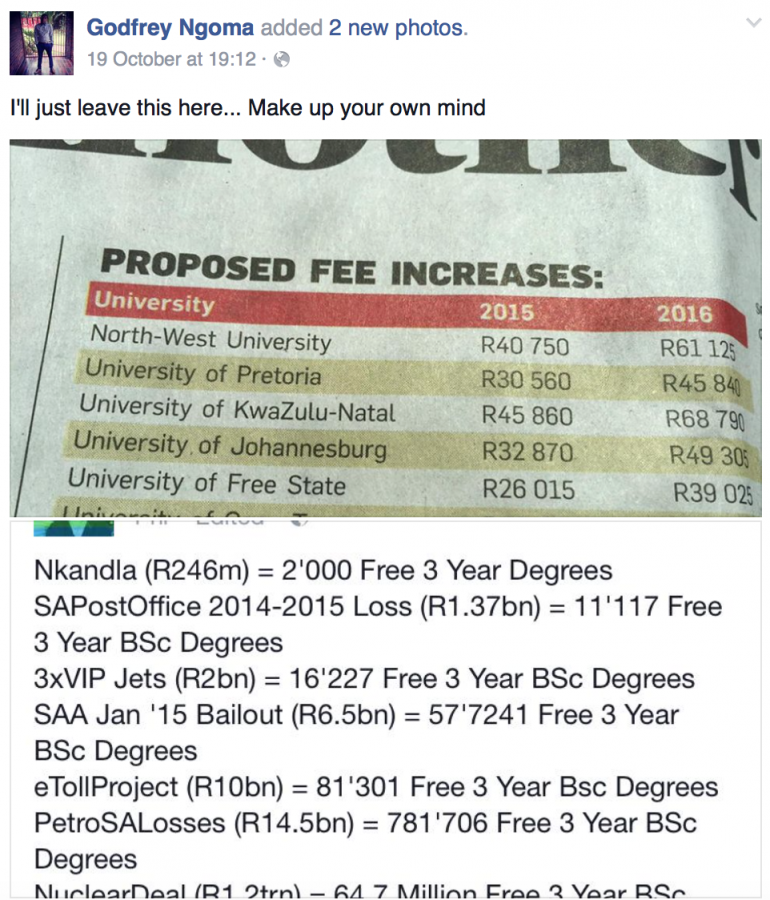
What I Learnt at Parliament Yesterday…
University of Cape Town (UCT) student ALASTAIR DURING was amongst the crowd of students who clashed with police yesterday. Here he shares his lessons learnt… What I learnt at Parliament yesterday…by Alastair During Parliament has shitty security. It’s harder to break into my parents’ house. The police were more violent than the protesters. Stun grenades […]

University of Cape Town (UCT) student ALASTAIR DURING was amongst the crowd of students who clashed with police yesterday. Here he shares his lessons learnt…

What I learnt at Parliament yesterday…by Alastair During
- Parliament has shitty security. It’s harder to break into my parents’ house.
- The police were more violent than the protesters.
- Stun grenades have more bark than bite.
- Students in South Africa are doing exactly what they should be doing: making the government accountable for the poor management of the country’s finances.
- There was a good mix of ANC, DA, PAC and EFF supporters (for those of you who think otherwise).
- There was a mix of white and black protesters that accurately portrays the racial mix of the general population.
- The colour of your skin, or the political party you supported, didn’t matter. Everyone was protesting for the same cause.
- I need to learn isiXhosa. I can only contribute so much by clapping my hands in rhythm.
For all of you who have (like me) been watching from a distance and basing their opinion on video-clips and emotive/subjective news articles, just do yourself a favour and go check it out.
You can watch from a distance, but there’s no better perspective than a first hand perspective.
Anyway, that’s just my 2-cents. x
***
Watch yesterday’s events as students are pushed back while singing the National Anthem:
***
As students gather in solidarity around South Africa, support has come from various quarters including food and drop-off points, tips on how to handle tear gas (milk and a rag soaked in vinegar) and a campaign from academic staff supporting the students (see below).
In the meantime Gwede Mantasha, ANC Secretary General, has “condemnded” the actions of Wits University’s vice-chancellor Adam Habib, accusing him of taking “action to close SRC account in order to deepen the crisis with the intention to deprive students from writing exams”.
President Zuma is due to meet with university management and student leaders tomorrow in Pretoria, at the same time that a march of 10,000 students is planned on the Union Buildings.
***
Academic Staff Campaign for Support of Student Struggle
In an unprecedented show of support, academic staff at universities in South Africa have created a campaign calling on colleagues around the world to to sign and stand with South African students in their “struggle for a democratised higher education sector”.
The statement stresses the urgency of a new national funding structure. It reads as follows:

We have witnessed students act with extraordinary discipline, tactical skill and moral purpose. This commitment and self-control has gone unseen by many university managers, government leaders and the media who have misrepresented students as uninformed, irresponsible or irrational. Protesting students have faced and overcome potentially divisive tensions within their ranks, and have shown maturity in their intellectual arguments and political interventions. Above all, they have required us to confront a grievous national problem: the persistent exclusion of those who are black and poor from higher education, and from the opportunities that higher education makes possible.
We strongly object to the manner in which university managements have criminalised student protest. We strongly object to the continued use of repressive force to harm and intimidate students and to belittle their demands and experiences. Any viable leadership of higher education should be listening to and amplifying student voices. Instead we are in the midst of a leadership crisis where Vice-Chancellors and government ministers pass the buck back and forth and no-one is willing to take responsibility for changing the untenable conditions of higher education. Current student protest is a direct consequence of the manner in which university governance has underestimated proper consultation and work with students and other constituencies of our universities.
Students are insisting that a frank national debate be opened on both the funding and orientation of higher education. We reiterate the urgency of this debate, and call on our Vice-Chancellors, the Department of Higher Education and Training and National Treasury to understand that creative alternatives are now both urgent and essential. We cannot continue as usual. We are no longer in a moment in which we can quibble over percentages. We watch, year on year, as public funding of higher education is diminished, effectively turning our universities into semi-private institutions. We can no longer in good faith call them public universities, as student fees escalate, along with student debt, as workers are outsourced to private companies, large bonuses are paid to senior administrators, and academic life is increasingly corporatised.

South Africa is one of the most unequal societies in the world. It is no longer tenable that the burden of balancing the university ledger be placed on the backs of the poorest students and the worst-paid workers who have the least capacity to bear it. The current system of funding students is dysfunctional and ineffective. Unequal access to higher education can only be addressed in one way: to make our universities fully publicly funded by government. We argue that the value of democratic, independent universities to the public good cannot be underestimated and that radical solutions to the funding crisis, such as a national wealth tax, are necessary.
We salute our students in their principled call for fully-funded transformative education, we call for a radical reinvestment in public universities by all who manage, work and study in them, and we commit ourselves and our work to the creation of a society in which all can thrive.
Numerous signatures appear beneath the statement.
View more here: http://www.amandla.mobi/student_struggle